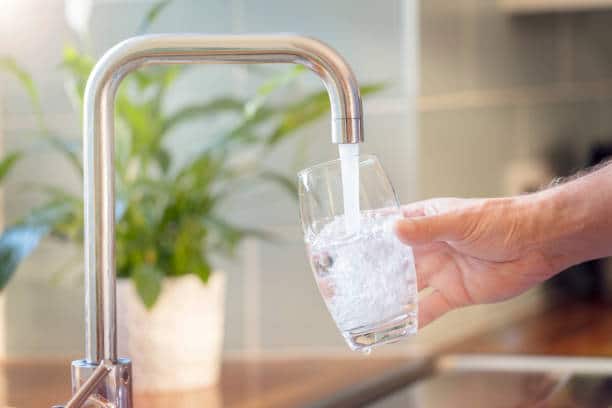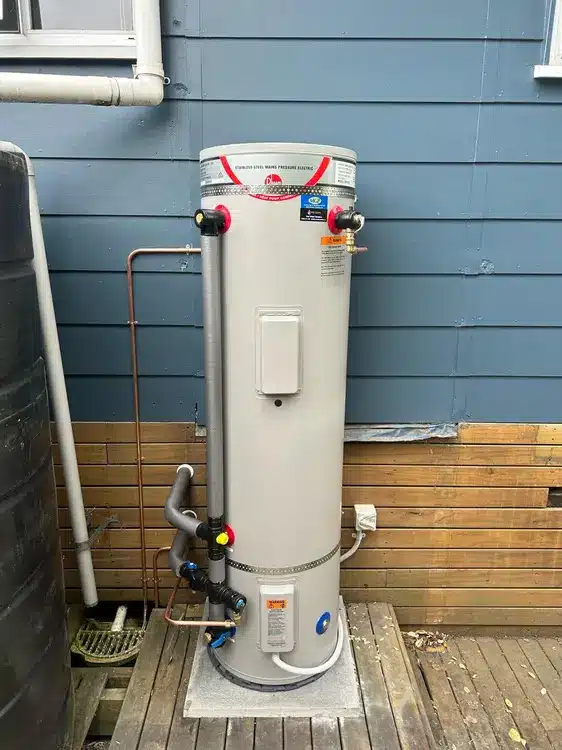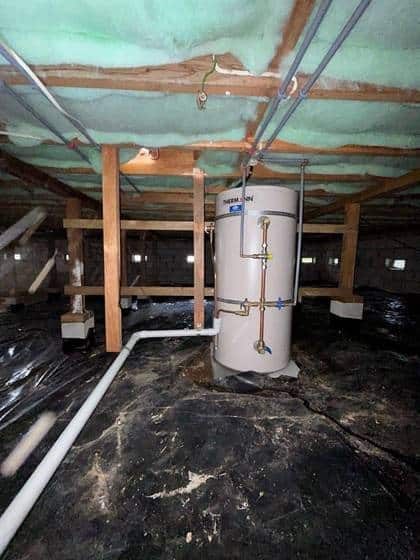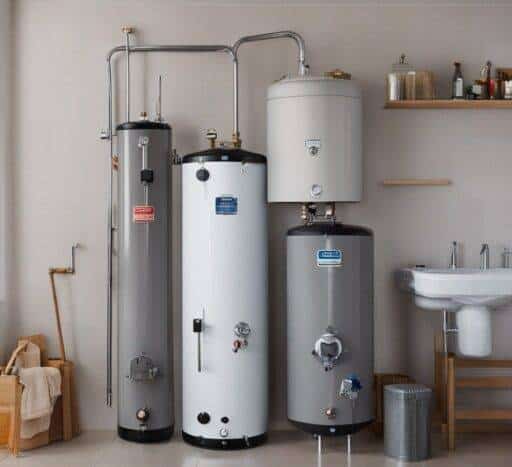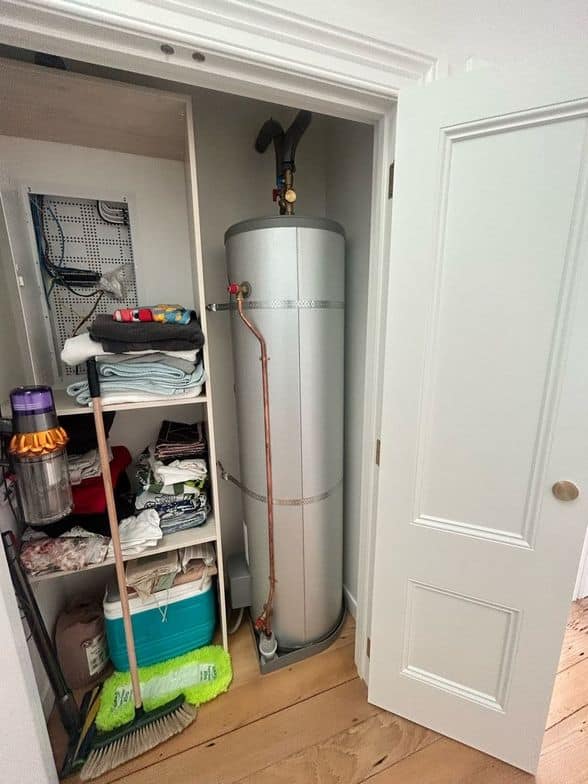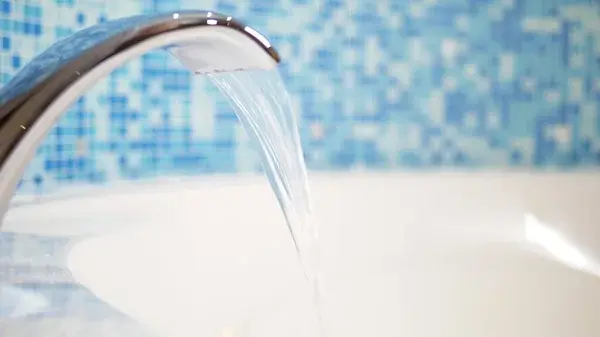Boosting Performance with Combi Boilers and Pre-Heat Settings
Combi boilers heat water on demand, which means you don’t need a hot water cylinder. However, some modern combi boilers come with hot water pre-heats, where a small volume of water is kept warm inside the boiler to reduce waiting time when you turn on the tap.
While convenient, pre-heat modes use extra energy. To improve efficiency:
- Disable the pre-heat function if you can tolerate a slight delay.
- Use a timer to restrict the pre-heat period to mornings or evenings only.
- Consider turning the pre-heat off completely during warmer months.
In NZ homes with newer combi systems, especially in urban areas like Wellington or Hamilton, disabling pre-heat can reduce standby energy loss by up to 10%.
Understanding Boilers That Work with a Hot Water Cylinder
Homes with traditional or system boilers typically also have a separate hot water cylinder for home storage. This allows water to be heated in bulk, then distributed as needed.
To improve efficiency in these setups:
- Use a programmable timer to heat water only when required (e.g., early morning and evening).
- Ensure the boiler thermostat is set just above 60°C to prevent bacterial growth but not excessively high.
- Regularly service your boiler and cylinder to maintain performance and safety.
These systems are common in larger homes or multi-bathroom properties in Christchurch and Auckland. Pairing a modern condensing boiler with an insulated cylinder provides efficient, reliable hot water for bigger families.
Don’t Ignore Cylinders in Cold Spaces
If your hot water cylinder is located in an unheated area—such as a garage, under the house, or in a basement—it could be losing more heat than you realise. Cylinders in cold spaces are highly susceptible to heat loss, even with built-in insulation.
Here’s how to minimise it:
- Add an extra insulation jacket around the cylinder (especially if it’s more than 5 years old).
- Seal any drafts around the cylinder’s location to reduce cold air exposure.
- Insulate pipes leading to and from the cylinder.
This is particularly important in cooler NZ cities like Dunedin or Invercargill, where ambient temperatures in these spaces can drop significantly in winter.
Choosing the Right Cylinder Size for Your Needs
Oversized cylinders waste energy, while undersized ones can leave you with cold showers. Picking the right cylinder size is essential for both efficiency and comfort.
General Guidelines:
- 1–2 people: 90–120 litres
- 3–4 people: 180–210 litres
- 5+ people or multi-bathroom homes: 250–300+ litres
Your hot water usage habits (e.g., frequent baths, multiple showers at once) should guide your decision. For a tailored recommendation, consult a professional or use an online sizing tool. For NZ households, especially those with solar or heat pump setups, sizing should also factor in the recovery rate and system type.
Managing Your Cylinder Temperature for Efficiency
Setting your cylinder temperature correctly can have a major impact on both safety and energy use. The ideal temperature is around 60–65°C:
- Too low (<50°C): Risk of Legionella bacteria developing.
- Too high (>65°C): Wastes energy and increases scalding risk.
If your system allows, set the thermostat to maintain this safe but efficient range. Use mixing valves to deliver water to taps at a safe, lower temperature (around 50°C), particularly in homes with young children or elderly occupants.
Insulate Those Uninsulated Hot Water Pipes
Uninsulated hot water pipes can lead to significant heat loss—especially over long pipe runs or in colder areas of your home. This causes delays in hot water delivery and higher energy usage, as the system works harder to compensate.
Here’s what to do:
- Use foam pipe insulation sleeves, available at most hardware stores.
- Focus on pipes within 1–2 metres of the cylinder or boiler, and any that pass through cold zones.
- Insulate external hot water pipes with weatherproof materials.
This low-cost upgrade pays off quickly in energy savings and improved performance, especially during NZ’s colder months.
Save Water and Energy with Smarter Taps
Single lever mixer taps, found in most modern NZ kitchens and bathrooms, can accidentally waste hot water. Because the lever often rests in the centre, turning it on quickly draws hot water even when cold would suffice.
Efficiency tips:
- Adjust the lever to cold before using the tap for quick rinses or cleaning.
- Install flow restrictors or aerators to reduce water usage.
- Choose taps with clear hot/cold indicators and adjustable settings.
Being mindful of how taps operate can reduce both hot water use and the energy required to heat it.
Fix Leaking Hot Taps and Showers Promptly
A leaking hot tap or shower can be more than just an annoyance, it’s a hidden source of energy waste. Even a slow drip from a hot tap can add up to litres of heated water lost every day.
Common causes include:
- Worn washers or cartridges
- Faulty mixer valves
- High system pressure or limescale
Fixing leaks promptly saves water and prevents your cylinder or boiler from reheating unnecessarily. In areas with harder water, like parts of Canterbury or the Bay of Plenty, regular descaling may also help prevent leaks from forming in the first place.
Combining All Tips for Maximum Efficiency
Improving hot water efficiency doesn’t require a complete system overhaul. Small changes, like insulating pipes, fixing leaks, or adjusting temperatures, can yield big savings over time. If you’re looking to replace your system entirely, consider investing in a modern hot water cylinder for home that meets your household’s size, efficiency, and pressure needs. Providers like Hot Water Solutions NZ offer expert advice and installation services throughout the country.
Final Thoughts
Hot water efficiency is about more than saving money, it’s about ensuring comfort, safety, and sustainability in your home. From cylinder sizes and boiler compatibility to fixing leaking hot taps and showers, these practical steps can make a real difference.
For expert guidance and professional installation in NZ cities like Auckland, Wellington, or Christchurch, visit Hot Water Solutions NZ your trusted source for energy-smart water heating systems.

